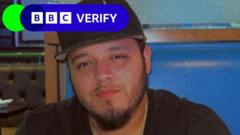The unsettling story of Eden Knight, a trans woman who took her own life after returning to Saudi Arabia, is under scrutiny as investigations uncover links between her and lawyer Bader Alomair, who allegedly misled her on asylum matters, intensifying the spotlight on Saudi Arabia's treatment of LGBTQ+ individuals.
Investigation Unveils Alleged Role of Saudi Lawyer in Trans Student's Tragic Suicide

Investigation Unveils Alleged Role of Saudi Lawyer in Trans Student's Tragic Suicide
A BBC investigation reveals that Bader Alomair, a Saudi lawyer with embassy ties, may have influenced trans student Eden Knight's return to Saudi Arabia, leading to her tragic suicide.
Eden Knight, a prominent trans woman from Saudi Arabia, tragically took her own life in March 2023 following her return to the Kingdom. A suicide note she posted on X revealed her anguish, mentioning Bader Alomair, a Saudi lawyer who purportedly persuaded her to abandon her asylum claim in the U.S. Alomair's ties to the Saudi embassy in Washington D.C. have since been identified, raising concerns over his involvement in the well-being and rights of Saudi students abroad.
Knight had migrated to Virginia in 2019 on a Saudi scholarship to pursue her studies at George Mason University. During her time in the U.S., she publicly transitioned and found an accepting community online, embarking on a journey of self-acceptance. However, upon seeking asylum due to societal rejection and fears for her safety, Knight allegedly received misleading advice from Alomair. He reportedly convinced her it was necessary to return home to secure asylum, despite U.S. immigration experts casting doubt on such advice.
Following Knight's relocation to Washington, D.C., supported by Alomair, she became increasingly disillusioned, sharing with friends how her identity was being undermined. She described experiences of coerced detransitioning, claiming that her lawyer sought to erase her femininity by making her discard her clothes and cease hormone therapy.
After a brief period where she appeared to flourish, her situation deteriorated rapidly. Messages from Eden indicated that her family had confiscated her passport and restricted her autonomy, leading her to feel trapped. The distress culminated in her decision to take her own life, sparking outrage and concern among her online community.
The BBC's investigation into Alomair revealed his roles in assisting other Saudi students facing legal troubles in the U.S. He had reportedly facilitated the return of two students accused of murder in a controversial case, raising further questions about his practices and motivations.
As the investigation unfolds, it shines a light on the challenges faced by LGBTQ+ individuals in Saudi Arabia—a nation where societal and governmental rejection often results in dire consequences. Alomair has yet to respond to the numerous allegations against him, and the embassy has not issued a statement on the matter. Meanwhile, advocates continue to call for recognition and protection for the rights of transgender individuals globally, emphasizing the need for systemic change in countries like Saudi Arabia.
Knight had migrated to Virginia in 2019 on a Saudi scholarship to pursue her studies at George Mason University. During her time in the U.S., she publicly transitioned and found an accepting community online, embarking on a journey of self-acceptance. However, upon seeking asylum due to societal rejection and fears for her safety, Knight allegedly received misleading advice from Alomair. He reportedly convinced her it was necessary to return home to secure asylum, despite U.S. immigration experts casting doubt on such advice.
Following Knight's relocation to Washington, D.C., supported by Alomair, she became increasingly disillusioned, sharing with friends how her identity was being undermined. She described experiences of coerced detransitioning, claiming that her lawyer sought to erase her femininity by making her discard her clothes and cease hormone therapy.
After a brief period where she appeared to flourish, her situation deteriorated rapidly. Messages from Eden indicated that her family had confiscated her passport and restricted her autonomy, leading her to feel trapped. The distress culminated in her decision to take her own life, sparking outrage and concern among her online community.
The BBC's investigation into Alomair revealed his roles in assisting other Saudi students facing legal troubles in the U.S. He had reportedly facilitated the return of two students accused of murder in a controversial case, raising further questions about his practices and motivations.
As the investigation unfolds, it shines a light on the challenges faced by LGBTQ+ individuals in Saudi Arabia—a nation where societal and governmental rejection often results in dire consequences. Alomair has yet to respond to the numerous allegations against him, and the embassy has not issued a statement on the matter. Meanwhile, advocates continue to call for recognition and protection for the rights of transgender individuals globally, emphasizing the need for systemic change in countries like Saudi Arabia.



















